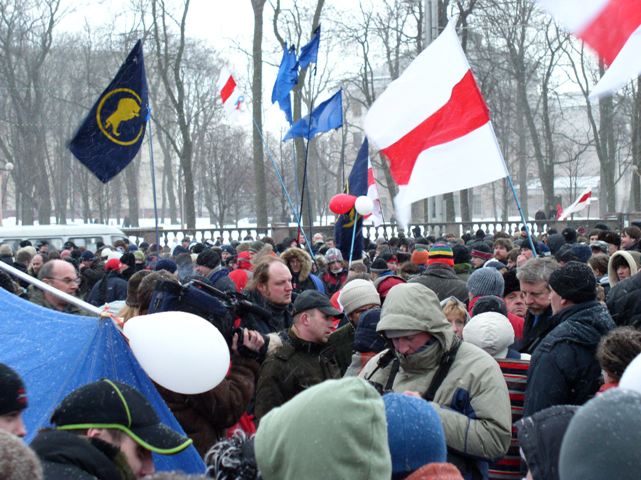Belarusian protest leader ripped up passport to avoid expulsion, allies say
Kolesnikova's disappearance followed the arrest or flight of other opposition figures before and since last month's presidential election, which official results showed had been won by Lukashenko with 80% of the vote. Deputy Ukrainian Interior Minister Anton Gerashchenko had earlier told Reuters Kolesnikova had successfully prevented "a forcible expulsion from her native country".

- Country:
- Belarus
Belarusian authorities drove prominent opposition leader Maria Kolesnikova to the border with Ukraine on Tuesday, a day after she was snatched from the street in Minsk, but she tore up her passport so they could not force her to cross, two of her allies said. The fate of Kolesnikova, a key figure during four weeks of mass protests against President Alexander Lukashenko, had been a mystery since supporters said masked men had whisked her away in a van on Monday. Belarusian police were quoted as saying they had not detained her.
Two fellow opposition figures, Anton Rodnenkov and Ivan Kravtsov, told a news conference in Kyiv that they had been detained by Belarusian officials in plain clothes, who escorted them to the border and then put Kolesnikova into their car and told them to cross. "As soon as she ended up in the car and saw her passport, she immediately took her passport and tore it up into little pieces and crumpled the pieces and threw them out the window at the people standing around the car," Rodnenkov said.
"After that, she opened the window and got out (through the window) and walked towards the Belarusian border." There she was detained by the Belarussians again. Kolesnikova's disappearance followed the arrest or flight of other opposition figures before and since last month's presidential election, which official results showed had been won by Lukashenko with 80% of the vote.
Deputy Ukrainian Interior Minister Anton Gerashchenko had earlier told Reuters Kolesnikova had successfully prevented "a forcible expulsion from her native country". "Maria Kolesnikova made a courageous act that did not allow the Belarusian special services to expel her to the territory of Ukraine," he said. "All responsibility for her life and health is on Alexander Lukashenko, the dictator of Belarus."
LUKASHENKO Soon after the border incident, Lukashenko told Russian reporters that he would not rule out holding new elections, but rejected any talks with opponents who he said were bent on steering the country towards disaster.
Police detained dozens of people from among hundreds who protested on Tuesday evening against Kolesnikova's disappearance. Masked police dragged some of the protesters away from the crowd, including some women who they pulled by their hair, a witness said. Fellow opposition leader Sviatlana Tsikhanouskaya, who is in exile in neighbouring Lithuania, called for Kolesnikova to be released, telling Reuters that her detention would only inflame the anti-government protests.
Kolesnikova's whereabouts were unclear. "Kolesnikova has now been detained, I can't say concretely where she is, but she has been detained," Anton Bychkovsky, a representative of the Belarusian border service, told Reuters by phone.
"She was detained in connection with the circumstances under which they (the group) left the territory of Belarus," he said. 'MAYBE I OVERSTAYED'
Lukashenko, who has crushed dissent in Belarus for the past 26 years, conceded in his interview with Russian journalists that he may have held onto power too long. "Yes, maybe I overstayed a bit," Russian journalist Roman Babayan cited Lukashenko as saying.
But the 66-year-old leader said he was the only person capable of protecting the country for now. Lukashenko said his supporters would be attacked if he left power, said Babayan, editor-in-chief of the Moscow Talks radio station.
"I won't talk to the opposition Coordination Council because I don't know who these people are," Lukashenko said. "They are no sort of opposition. Everything they suggest is a catastrophe for Belarus and the Belarusian people." Belarus has seen a tense political stalemate since the disputed presidential election on Aug. 9, with protesters flooding the streets and security forces responding with mass arrests and - according to some of those detained - beatings and torture.
The country of 9.5 million people is of key strategic interest to Moscow as a route for its oil and gas exports and a buffer between NATO and Russia. Lukashenko denies opponents' accusations of vote-rigging and has accused foreign powers of trying to topple him in a revolution. He retains the backing of Russian President Vladimir Putin, a key ally, but faces the prospect of European Union sanctions later this month against Belarusian officials involved in the election and its violent aftermath.
With the detention of Kolesnikova and the arrest or flight of other opposition figures, the president has attempted to cripple the leadership of the protest movement, yet it shows no sign of abating.
(This story has not been edited by Devdiscourse staff and is auto-generated from a syndicated feed.)
ALSO READ
Moscow summons Slovenian ambassador over expulsion of Russian diplomat, says TASS
Athletics-Lithuanian Alekna shatters men's discus world record
Lithuania's Mykolas Alekna breaks discus throw record that stood since 1986
Rheinmetall to sign a protocol of intention for ammunition factory in Lithuania, government says
Lithuania signs deal with Rheinmetall for ammunition plant










